 It is an inescapable fact that once a person begins to study the Bible in earnest, he is bound to make a startling discovery that much of what Christianity is based upon is nothing more than fiction and fantasy! The cornerstone of the Christian ghost-house of faith is the Dogma of the Most Blessed Trinity, concocted by the Gentile Church over the course of a few hundred years in the first millennium CE. The moment when a serious student of Scripture rejects that pagan concept of three co-equal, co-eternal and co-existing gods running the Universe, marks the beginning of spiritual freedom when the real growth in faith and truth of One God can begin! With the foundational stone of all falsehood out of the way, the entire structure of Christian theological thinking begins to crumble and disintegrate.
It is an inescapable fact that once a person begins to study the Bible in earnest, he is bound to make a startling discovery that much of what Christianity is based upon is nothing more than fiction and fantasy! The cornerstone of the Christian ghost-house of faith is the Dogma of the Most Blessed Trinity, concocted by the Gentile Church over the course of a few hundred years in the first millennium CE. The moment when a serious student of Scripture rejects that pagan concept of three co-equal, co-eternal and co-existing gods running the Universe, marks the beginning of spiritual freedom when the real growth in faith and truth of One God can begin! With the foundational stone of all falsehood out of the way, the entire structure of Christian theological thinking begins to crumble and disintegrate.
For more than a decade prior to discovering the truth of the One God of Israel, I had taught and preached the Doctrine of the triune god of Christendom as the gospel truth itself. My faith in the dogma stemmed from my trust in the Church Universal and the many “biblical” references scattered throughout the New Testament to support the belief! Borrowing a line from a famous hymn: “My faith was built on nothing less . . . than fabricated scribal texts!” The New Testament is literally strewn with various passages that serve as “proof texts” for Trinitarian theologians. Most of them, however, are no more than “well-intentioned” frauds committed by our Gentile believers in a pagan deity!
If you have studied with “The Rock of Israel” for some time now, you know that passages such as Matthew 28:19, which states that we are to “baptize in the name of the Father, Son and Holy Ghost,” or I John 5:7-8, claiming that “there are three who testify in heaven: the Father, the Word and the Holy Spirit,” are among some much later additions to the Greek manuscripts and are widely known today to be “pious” Church fabrications, produced in order to prop up the emerging doctrine of the three-headed god of the Trinity. It is a sad reality that the pagans of the world co-opted the faith in the Jewish Messiah to create yet another polytheistic cult!
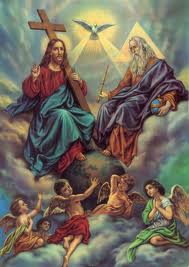 In my experience of counseling with the people who have determined to leave the falsehoods of Christianity and embrace the One True and Living God of Israel, I have witnessed the following phenomenon occurring with a great deal of consistency. All of them desired to know what to do with Jesus Christ in general and his relationship to God the Father in particular! Before we answer this question, I’d like to remark that that type of thinking is a clear evidence that the Church’s strategy of “replacing the Jewish God” with their own version thereof has been remarkably effective. In opposition to the One God of Israel, who required His Chosen People to walk in accordance with His Law and decrees, the new “god” of Christendom was proclaimed to be in fact some three co-equal deities; the Church’s religion turned out to be hostile to God’s immutable Law and substituted it with a set of “New Testament” regulations and heathen traditions; the Messiah of Israel became Cosmic Christ and was “voted” into the position of the Second Persona within a “compounded” godhead! The new religious cult was truly born!
In my experience of counseling with the people who have determined to leave the falsehoods of Christianity and embrace the One True and Living God of Israel, I have witnessed the following phenomenon occurring with a great deal of consistency. All of them desired to know what to do with Jesus Christ in general and his relationship to God the Father in particular! Before we answer this question, I’d like to remark that that type of thinking is a clear evidence that the Church’s strategy of “replacing the Jewish God” with their own version thereof has been remarkably effective. In opposition to the One God of Israel, who required His Chosen People to walk in accordance with His Law and decrees, the new “god” of Christendom was proclaimed to be in fact some three co-equal deities; the Church’s religion turned out to be hostile to God’s immutable Law and substituted it with a set of “New Testament” regulations and heathen traditions; the Messiah of Israel became Cosmic Christ and was “voted” into the position of the Second Persona within a “compounded” godhead! The new religious cult was truly born!
As we have intimated earlier, there are quite a few “shelter” texts within the pages of the New Testament, where the devout Trinitarians can hide in their unwillingness to relinquish that heathen belief. These flimsy textual “shelters,” however, cannot withstand the blockbusting power of the dynamite truth of the real Word of God, - the time-honored Hebrew Scriptures! When the hide-outs of Matthew 28, I John 5 and others lie in shambles, where do the staunch supporters of the Church dogmatism find their refuge next? One of the most favored haunts of our Trinitarian friends is the text of the Epistle to Hebrews. It seems to equate the divinity of Jesus with that of God the Father Himself in some unequivocal terms. Let us examine the facts to see if this particular “shelter” is truth-proof!
 Before we immerse ourselves in the text of the Bible, however, allow me to bring to your attention a letter from one of our most thoughtful readers. It showcases how a savvy student of the Bible can bring to the discussion table a number of well-put arguments in support for the Church’s view of God as the Divine Trio:
Before we immerse ourselves in the text of the Bible, however, allow me to bring to your attention a letter from one of our most thoughtful readers. It showcases how a savvy student of the Bible can bring to the discussion table a number of well-put arguments in support for the Church’s view of God as the Divine Trio:
“Rabbi, I have been studying your website and so far I have a question about Jesus as God. If I understand correctly you are saying that Jesus is not God and should not be worshiped, (please correct me if I misunderstand). My question comes from the text in Hebrews 1 vs. 2. It says that God “created the universe through His Son. . .”; vs. 4 states that “Jesus is superior to the angels”; vs. 6 says, "Let all of God's angels worship him”; in vs. 8 He says, "Your throne, O God, will last forever and ever”; and in vs. 10 He says "In the beginning, Adonai, you laid the foundations of the earth; heaven is the work of your hands..." Can you explain this chapter in Hebrews in light of what you are teaching?”
A statement like this one represents a classical approach to Christian apologetics of defending the Church’s Dogma of Trinity. It deserves a point-by-point response, which we are happy to provide!
Let us begin, therefore: “In the past God spoke to our forefathers through the prophets at many times and in various ways, 2 but in these last days he has spoken to us by his Son, whom he appointed heir of all things, and through whom He made the universe.” (Hebrews 1:1-2) –
Prophetic Oracles:
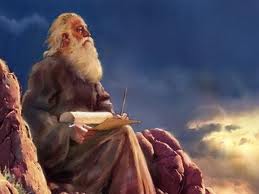 First off, the message that God brought forth through His Son is portrayed here as an inspired continuation of what the prophets of the Almighty declared! The Son’s message is to build upon and elaborate the oracles of the Holy One, not to change or supersede them! What is the core substance of every genuine oracle of God?
First off, the message that God brought forth through His Son is portrayed here as an inspired continuation of what the prophets of the Almighty declared! The Son’s message is to build upon and elaborate the oracles of the Holy One, not to change or supersede them! What is the core substance of every genuine oracle of God?
No other prophet of God presents the humankind with more eloquent pleadings of our Creator than Isaiah: “Turn to me and be saved, all you ends of the earth; for I am God, and there is no other. By myself I have sworn, my mouth has uttered in all integrity a word that will not be revoked: Before me every knee will bow; by me every tongue will swear. They will say of me, ‘In the LORD alone are righteousness and strength.’” All who have raged against him will come to him and be put to shame. But in the LORD all the descendants of Israel will be found righteous and will exult.” (Is. 45:22-25) – The all-capitalized “LORD” is the covenantal Name of the God of Israel! Have you turned to the LORD God of Israel in your life? Do you worship Him? Does your righteousness proceed from this very God or someone else? Do you keep His Commandments?
Also, take a look at the following statement of Jeremiah, a bona fide representative of all the true prophets of God: “But I have spoken to you again and again, yet you have not obeyed me. Again and again I sent all my servants the prophets to you. They said, “Each of you must turn from your wicked ways and reform your actions; do not follow other gods to serve them.” (Jer. 35:14-15) – The burden of this and all the other prophetic pleadings in the Bible is twofold: a) people are to return to their monotheism, i.e. they should worship but One God, the LORD God of Abraham, Isaac and Jacob, and b) they are to walk in conscientious obedience to all of the Torah’s Commandments.
The Church, however, has stubbornly insisted for thousands of years that Jesus’ coming changed all that! According to Christendom’s “light” we have now a new understanding of God, - He is not One but a compounded unity of three unique individuals, the Divine Trio; and the Law of God no longer applies to those of us who are “under grace and not under the law.” The Jesus of the Church, then, is not the Jewish Messiah of the Bible, but some Cosmic Christ, created at the Church’s whim, alongside the new and strange deity of Trinity!
Creation Aspect:
 “. . . and through whom He made the universe.” (Hebrews 1:2) - Second, the text of Hebrews 1:2 teaches that God created the Universe by means of His Son. What does that mean? Well, according to the established view within the Church, it means that during the Creation Week God the Father would say a command, such as “Let there be light!” and God the Son would rush to carry it out! The Holy Ghost, apparently, would animate the whole deal by His presence! Once again, we are presented with the picture of three independent gods, “working together for the benefit of all creation.” This is not a picture of One God as the Bible and Judaism teach us! This is a thoroughly pagan concept of the Cosmos!
“. . . and through whom He made the universe.” (Hebrews 1:2) - Second, the text of Hebrews 1:2 teaches that God created the Universe by means of His Son. What does that mean? Well, according to the established view within the Church, it means that during the Creation Week God the Father would say a command, such as “Let there be light!” and God the Son would rush to carry it out! The Holy Ghost, apparently, would animate the whole deal by His presence! Once again, we are presented with the picture of three independent gods, “working together for the benefit of all creation.” This is not a picture of One God as the Bible and Judaism teach us! This is a thoroughly pagan concept of the Cosmos!
If we want to preserve the integrity of this and other New Testament passages, we are to reconcile their portent with the text of the Hebrew Bible! How did God create the Universe “in the very beginning of all things”? The Scriptures tell us that the Living God of Israel spoke the worlds into existence. God said . . . and it stood fast (see Gen. 1). “By the word of the LORD were the heavens made, their starry host by the breath of his mouth. . .For he spoke, and it came to be; he commanded, and it stood firm.” (Ps. 33:6,9) – As you can see, both the Word of God and His Spirit are present in this text. Unlike their heathen neighbors, however, who loved to personify the forces of Nature and other phenomena, the Hebrews never invented other gods beside their Creator, who led them out of Egypt!
The Hebrew Bible also insists that apart from the God of Israel, there was no other divine being by His side to help Him out with the task. Please, examine the following evidence:
Nehemiah: “Blessed be your glorious name, and may it be exalted above all blessing and praise. You alone are the LORD. You made the heavens, even the highest heavens, and all their starry host, the earth and all that is on it, the seas and all that is in them. You give life to everything, and the multitudes of heaven worship you.” (Neh. 9:5-6) – In Hebrew all of the verbs pertaining to the One who created all things are in the masculine singular, which rules out the three co-equal “gods” running around and putting things into place!
Isaiah: “This is what the LORD says — your Redeemer, who formed you in the womb: I am the LORD, who has made all things, who alone stretched out the heavens, who spread out the earth by myself . . .” (Is. 44:24) – Did you notice the words, “alone” and “by myself”? How many deities were there during Creation? Who is your Redeemer, beloved?
Here is more from Isaiah: “This is what the LORD says — the Holy One of Israel, and its Maker . . . It is I who made the earth and created mankind upon it. My own hands stretched out the heavens; I marshaled their starry hosts.” (Is. 45:11,12) – Doesn’t the phrase “My own hands” rule out the possibility of God’s Cosmic Son carrying out the commands of his aging Father, as the Church seems to suggest!?
 In Isaiah 48 we read: “Listen to me, O Jacob, Israel, whom I have called: I am he; I am the first and I am the last. My own hand laid the foundations of the earth, and my right hand spread out the heavens . . .” (Is. 48:12-13) – Would not our God have said “I am them,” if He wanted us to know that He is in fact “composed” of some three independent deities? Isn’t it crystal clear that the God of Israel is the only true God out there, the only Creator?! Or, perhaps, by following the Church’s mode of interpretation, we are to suppose that the “hand of God” is also an independent reality, a fourth deity?
In Isaiah 48 we read: “Listen to me, O Jacob, Israel, whom I have called: I am he; I am the first and I am the last. My own hand laid the foundations of the earth, and my right hand spread out the heavens . . .” (Is. 48:12-13) – Would not our God have said “I am them,” if He wanted us to know that He is in fact “composed” of some three independent deities? Isn’t it crystal clear that the God of Israel is the only true God out there, the only Creator?! Or, perhaps, by following the Church’s mode of interpretation, we are to suppose that the “hand of God” is also an independent reality, a fourth deity?
Hezekiah: “Then Hezekiah prayed to the LORD, saying: “O LORD of hosts, God of Israel, the One who dwells between the cherubim, You are God, You alone, of all the kingdoms of the earth. You have made heaven and earth. . . Now therefore, O LORD our God, save us from his hand, that all the kingdoms of the earth may know that You are the LORD, You alone.” (Is. 37:15-16,20) – The simplest possible test as to whether the Church worships the same God that the Scriptures reveal is to ask: “Why doesn’t the Church mention the God it worships by His biblical names, one of the most consistent of which is the God of Israel?”
In biblical view, God created the Universe by speaking His powerful Word. By definition, the Word that proceeds out of God is divine by its very nature. It is not, however, another person within some compounded and schizophrenic deity! We deal with the question of LOGOS (God’s Word) as it appears in John’s Gospel in our presentation entitled “Who is the LOGOS of John’s Gospel?” Without repeating myself too much on the same subject, I have to say that the personified concept of LOGOS as an independent and divine creator of the Universe is a thoroughly pagan idea, born in the depth of heathenism long before Christ walked the Earth! In fact, the notion that some divine LOGOS created the Cosmos was about 700 years old by the time John penned his Gospel!
Here is a conclusion: The phrase “ . . . and through whom He made the universe,” stands in harmony with the rest of the sacred Scriptures only when understood that by “whom” the text understands the Word of God! John corroborates this notion by stating that God’s Word “became flesh.” (John 1:14) The One God of the Bible created the Universe by speaking His Word! As one of God’s creative agencies, His Word is divine in nature but in no way constitutes another person within some multi-headed pagan deity!
When the same phrase is taken to mean that a few co-eternal deities were cooperating in creating the worlds, we are espousing a deeply heathen concept, alien to the very Spirit of the Holy Writ! If someone suggests that the Book of Hebrews leaves us with no other option by to embrace the novel teaching that the Son, “through whom God made the Universe,” is the second body within the Trinity, the Book itself ceases to be inspired by the God of Israel and should be consigned to the trash heap of pagan literature!
Creative Quoting
 In their zeal to create a new religion, the Christendom appealed to the Book of Hebrews and other Greek-language writings as supporting their emerging doctrine of a three-headed deity of Trinity. By quoting the non-existent texts of their own concoction, (such as Matthew 28:19, I John 5:7-8, etc.), and by adducing the verses of manuscripts akin to those found in the Epistle to Hebrews, the Church was successful in leading the uneducated masses away from the Living God of the Bible, - the Holy One of Israel. Today, we are examining the text of the Hebrews 1 in order to determine whether or not the Church’s dogma of Jesus as the Second Person of the Divine Pantheon rests on a solid biblical foundation.
In their zeal to create a new religion, the Christendom appealed to the Book of Hebrews and other Greek-language writings as supporting their emerging doctrine of a three-headed deity of Trinity. By quoting the non-existent texts of their own concoction, (such as Matthew 28:19, I John 5:7-8, etc.), and by adducing the verses of manuscripts akin to those found in the Epistle to Hebrews, the Church was successful in leading the uneducated masses away from the Living God of the Bible, - the Holy One of Israel. Today, we are examining the text of the Hebrews 1 in order to determine whether or not the Church’s dogma of Jesus as the Second Person of the Divine Pantheon rests on a solid biblical foundation.
Hebrews 1:3-5a: “. . . Higher than all the angels? . . .”
First, in order to highlight Jesus’ lofty status in heaven, the author goes to some great lengths showing that Christ is infinitely more exalted than even the holy angels of God: “ . . . After he had provided purification for sins, he sat down at the right hand of the Majesty in heaven. So he became as much superior to the angels as the name he has inherited is superior to theirs. For to which of the angels did God ever say, “You are my Son; today I have become your Father . . .” (Heb. 1:3-5) –
In Christian theology this passage is taken to mean that God the Father is addressing God the Son, confessing the Son’s exalted station with His own mouth! What is the original meaning of this text, as found in the Hebrew Bible? Who does God of the Bible address as His “Son”? The answer is found in the Jewish Scriptures, of course! Psalm 2, from which the quotation is lifted, is one of the so-called royal psalms, composed by Israel’s sweet singer, King David. As we all know very well, David began ruling the Kingdom of Israel during tumultuous and perilous times. He was a man of deep piety and faith, which found their expression in David’s prayerful collection of Psalms.
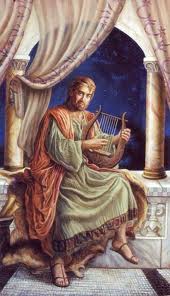 Finding himself in the position where he is “anointed” to defend the faith in One God and his own people of Israel against the continuous onslaught of the Gentile nations around them, David exclaims: “Why do the Gentiles conspire and the peoples plot in vain? The kings of the earth take their stand and the rulers gather together against the LORD and against his Anointed One.” (Ps. 2:1-2) – It is fairly easy to deduce who the raging nations are in this text. During the times of King Saul and David, Philistines, Amalekites, Moabites and other Gentile nations were among the archenemies of Israel, plotting to blot Israel and her faith in One God off the face of the world.
Finding himself in the position where he is “anointed” to defend the faith in One God and his own people of Israel against the continuous onslaught of the Gentile nations around them, David exclaims: “Why do the Gentiles conspire and the peoples plot in vain? The kings of the earth take their stand and the rulers gather together against the LORD and against his Anointed One.” (Ps. 2:1-2) – It is fairly easy to deduce who the raging nations are in this text. During the times of King Saul and David, Philistines, Amalekites, Moabites and other Gentile nations were among the archenemies of Israel, plotting to blot Israel and her faith in One God off the face of the world.
Who is the “Anointed One” in the text? Just as King Saul before him, and Solomon after him, David was anointed by the LORD God of Israel, (hence their title of the “anointed,”) to deliver the Chosen People from the hands of all their enemies! In this context, the phrase “His Anointed One” can refer either to the King of Israel, anointed for that office by the prophet Samuel, or the entire nation of Israel, often referred to, in the masculine singular, as God’s Servant (Is. 41:8-9; 42;1,18-20; 43:10; 44:1-2,21; 45:4; 48:12,20; 49:3,5,6; etc) In Exodus 4:22, Israel is also designated as God’s firstborn son!
Concerning Saul, it is written: “Now the day before Saul came, the LORD had revealed this to Samuel: “About this time tomorrow I will send you a man from the land of Benjamin. Anoint him leader over my people Israel; he will deliver my people from the hand of the Philistines.” (I Sam. 9:15-16) - Both the concept of “anointing” for leadership and the atmosphere of “strife” with the Gentiles are present in this passage as well.
About David, it is said: “These are the last words of David: “The oracle of David son of Jesse, the oracle of the man exalted by the Most High, the man anointed by the God of Jacob, Israel’s singer of songs. . .” (II Sam. 23:1) - The same idea of being “anointed by God” is applicable to every King of Israel that has been properly and legitimately installed!
The Psalm of King David continues: “The One enthroned in heaven laughs; the Lord scoffs at them. Then he rebukes them in his anger and terrifies them in his wrath, saying, “I have installed my King on Zion, my holy hill.” (Ps. 2:4) – There are a couple of important points in these verses. First, did you catch the fact that there is only “One enthroned in heaven” as in One God of Israel, instead of three co-equal deities of Christianity? The Hebrew Language is particularly clear in conveying the ideas of plurality and singularity, - there is only One Enthroned King of the Universe, friends!
Second, King David taunts the enemies of Israel by reminding himself, his listeners and their adversaries that the king of Israel has been installed by the Creator of the Universe and, therefore, cannot be subverted without God’s explicit consent to that! In other words, provided that Israel stays loyal to her God, the fuming heathen idolaters around her can do nothing to harm Israel and her anointed king!
David proceeds to cite God’s own promise to him and the House of Israel as an eternal and rock-sure guarantee of God’s protection for His people and their king: “I will proclaim the decree of the LORD: He said to me, “You are my Son; today I have become your Father. Ask of Me, and I will make the nations your inheritance, the ends of the earth your possession. You will rule them with an iron scepter you will dash them to pieces like pottery.(Ps. 2:7-9) – As you can see, the Hebrew Scriptures do not allow for a fanciful interpretation of this verse as if speaking of some Cosmic Son of the triune god! The language is that of the Covenant, made between the Rock of Israel and the Davidic kings over the House of Jacob!
It is a fair assumption that this particular prophecy may also be applied to Jesus of Nazareth as the Messiah of Israel, the son of one of David’s descendents, and, therefore, a King of Israel! However, it cannot refer to some Second Head within a Transcendent Deity, for it speaks of a perfectly human King of Israel! Unless we believe that Saul, David, Solomon and others, who were anointed by God and sat on the throne of Israel, were all divine, we should not create this myth for anybody else either!
Hebrews 1:5b: “. . . I will be his Father and he will be My son . . .”
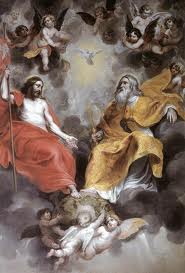 Verse 5 of Hebrews 1 is a composite quotation, knocked together by the writer of the book and presented as a positive proof of the divinity of the Son: “For to which of the angels did God ever say, “You are my Son; today I have become your Father”? Or again, “I will be his Father, and he will be my Son” (Heb. 1:5) – The quote presented to our attention here is supposed to teach us that none of the holy angels of God were blessed with the honor of being called “my son” by the Deity. It proves, therefore, that the Cosmic Christ is something truly “out of this world” and as exalted as God Himself, or . . . does it!?
Verse 5 of Hebrews 1 is a composite quotation, knocked together by the writer of the book and presented as a positive proof of the divinity of the Son: “For to which of the angels did God ever say, “You are my Son; today I have become your Father”? Or again, “I will be his Father, and he will be my Son” (Heb. 1:5) – The quote presented to our attention here is supposed to teach us that none of the holy angels of God were blessed with the honor of being called “my son” by the Deity. It proves, therefore, that the Cosmic Christ is something truly “out of this world” and as exalted as God Himself, or . . . does it!?
We have just seen that the first part of the verse speaks of King David, anointed by God and pronounced to be His very son! What about the second stanza? The same familial language of the father-son relationship is employed elsewhere in the Bible to underscore the intimate character of God’s involvement with Israel and her leadership. Addressing King David, the Prophet Nathan recites: “‘The LORD declares to you that the LORD himself will establish a house for you: . . . I will raise up your offspring to succeed you, who will come from your own body, and I will establish his kingdom. He is the one who will build a house for my Name, and I will establish the throne of his kingdom forever. I will be his Father, and he will be my son . . .” (II Sam. 7:11-14) –
Many Christian theologians stop citing the text at this point and tell us that the verses are a prophecy that speaks of the perfect Son of God. As you can see, this is the text from which the creative “genius” of the New Testament Book of Hebrews lifts his next reference! In harmony with so many other NT “composers,” the author of Hebrews picks his “proof-texts” with total disregard for their context and original meaning, - a very convenient practice for a fraudster!
Who does the prophecy in II Samuel 7 have in mind, a human being or a divine entity? Here is a continuation of the same text: “ . . . When he does wrong, I will punish him with the rod of men, with floggings inflicted by men. But my love will never be taken away from him, as I took it away from Saul, whom I removed from before you. Your house and your kingdom will endure forever before me; your throne will be established forever.” (vv.14-16) – Clearly, the prophecy is concerning an earthly offspring of King David, such as his successor on the throne of Israel, his son Solomon. One can also see that God’s promise to Israel and her role to be the “Light unto the Gentiles” is irrevocable and unchangeable!
According to the author of Hebrews, the one to whom God says, “You are my Son; today I have become your Father. . .” is “as much superior to the angels as the name he has inherited is superior to theirs.” However, the quotation from the Hebrew Bible shows plainly that these words are addressed to King David and his earthly posterity, the kings on the throne of Israel. When David and his sons were anointed to be rulers over Jacob, they were declared to be God’s very sons! Is David also divine? Is he also as superior to the angels as his name implies? Nonsense! The writer of the Book of Hebrews creatively combines his own theological commentary with the text of the original Jewish Scriptures, bending their meaning to suit his own needs!
Hebrews 1:6: “. . . Let all God’s angels worship him . . .”
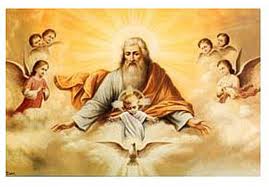 Have you noticed, by the way, a recurring refrain in the writings of this author? He is very eager to show to his captive audience that he bases his tractate on the solid foundation of the Holy Scriptures! That is why he keeps on saying: “And again . . .”: “And again, when God brings his firstborn into the world, he says, “Let all God’s angels worship him.” – What do we do with this particular text? It seems to be a potent proof that the Son is so “superior to the angels” that they are even commanded to worship him! Isn’t a text like this one among the most eloquent evidence that the Cosmic Son of God is part and parcel of the compounded deity of Trinity?
Have you noticed, by the way, a recurring refrain in the writings of this author? He is very eager to show to his captive audience that he bases his tractate on the solid foundation of the Holy Scriptures! That is why he keeps on saying: “And again . . .”: “And again, when God brings his firstborn into the world, he says, “Let all God’s angels worship him.” – What do we do with this particular text? It seems to be a potent proof that the Son is so “superior to the angels” that they are even commanded to worship him! Isn’t a text like this one among the most eloquent evidence that the Cosmic Son of God is part and parcel of the compounded deity of Trinity?
The answer to this question is very simple and straightforward: “There is no such text in the entire Hebrew Bible!” The text is nowhere to be found in the Jewish Scriptures; it exists only in the Greek version of the Bible, called Septuagint! Just as all the other “important” Greek-speaking texts of the “Bible,” the text of Septuagint underwent an extensive “overhaul” over the centuries of Christian “fine-tuning” of their theology and practice!
It is crucial to remember that Septuagint is the work of the Greek-speaking Gentile Church and has many changes introduced into the original text to make it conform to the Church’s beliefs and traditions. The fact that all the modern Bibles translate their “Old Testament” portions using the Hebrew Masoretic text instead of Septuagint testifies loudly and clearly to the solid consensus among the textual scholars that the Greek text of Septuagint is deficient and does not compare in its accuracy with the Hebrew original!
It is clear, therefore, that the writer of the Hebrews did not use the proper Hebrew text for his references, (quite an irony, to be sure), but availed himself of the widely-used corruption of the Greek Septuagint! In Septuagint the verse “Let all God’s angels worship him” is inserted in the passage found in Deuteronomy 32:43. I will adduce the text of that passage in order to show you the absurdity of what the author of the Hebrews is trying to convey! Here is the text as it appears in your Bibles: “Rejoice, O Gentiles, with his people, (and let all the gods (angels) worship Him); for he will avenge the blood of his servants; he will take vengeance on his enemies and make atonement for his land and people.” (Deut. 32:43) –
The verse in parenthesis is the one quoted by the New Testament theologian in his famous work. Even if we assume that the text was there in the original, (although that is clearly not the case), it has nothing to do with some Cosmic Son of the three-headed god! Given the context, the text could only have spoken about the Holy One of Jacob, - the One God of Israel! This way, the NT writer not only quotes from the Greek Septuagint instead of the Hebrew Bible, but he also ascribes to the passage the meaning that cannot be perceived in the original text!
Incidentally, the way I cited the text is among most traditional of Christian renditions! Given the real import of the text, one understands that our Christian translators simply could not render it otherwise! However, if you want to be really precise and true to what the original Hebrew text declares, here it is: “Acclaim, O Gentiles, His people, for He will avenge the blood of His servants; He will take vengeance on His enemies and make atonement for His land and people.” (Deut. 32:43) – The Gentiles of the Earth are not commanded to “rejoice” with the people of Israel, but to “acclaim” God’s people for the knowledge of One God and His Torah that Israel brought to the rest of the world! Just read the text in its context and it becomes exceedingly clear that God exalted His Covenantal People and made them to be His “royal priesthood and a holy nation” among the Gentiles of the world!
Hebrews 1:7: Angels and Flames of Fire . . .
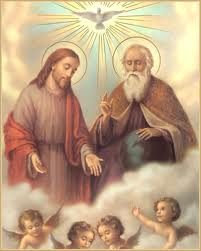 Before introducing the crown jewel of his less-than-sound theological discourse, the compiler of the Hebrews gives it a dramatic introduction by quoting, once again, from the Greek Septuagint: “In speaking of the angels he says, “He makes his angels winds, his servants flames of fire.” (Heb. 1:7) – This is a quote from Psalm 104:4. I am sure you can see with a naked eye that this particular rendition of the text is a clumsy parody of the intended meaning.
Before introducing the crown jewel of his less-than-sound theological discourse, the compiler of the Hebrews gives it a dramatic introduction by quoting, once again, from the Greek Septuagint: “In speaking of the angels he says, “He makes his angels winds, his servants flames of fire.” (Heb. 1:7) – This is a quote from Psalm 104:4. I am sure you can see with a naked eye that this particular rendition of the text is a clumsy parody of the intended meaning.
Translated properly, the text begins to make more sense: “He makes the winds His messengers, fiery flames His servants.” (Ps. 104:4) - The context is the key to understanding that the psalmist is speaking about the natural realm of things as serving the purposes of its Creator. Although angels constitute an important part of God’s heavenly kingdom, this particular psalm has nothing to do with them! As always, I encourage you to read the text in its entirety (the way it is supposed to be read)!
Hebrews 1:8-9: “. . . Your Throne, O God! . . .”
Having identified angels as servants of God, who are vastly inferior to His Cosmic Son, our Christian theologian continues: “But about the Son he says, “Your throne, O God, will last forever and ever, and righteousness will be the scepter of your kingdom. You have loved righteousness and hated wickedness; therefore God, your God, has set you above your companions by anointing you with the oil of joy.” (Heb. 1:8-9) – I have heard Christian evangelists declare that since God the Father Himself calls His Cosmic Son “God,” we are to do the same and with gusto too! Once again, the proper way to decipher what the psalmist says is to read the lifted piece of the poem in its proper intended context!
The quote is taken from Psalm 45:6-7. From first to last, the Psalm is addressed to the King of Israel, whose throne was believed to be the Throne of God Himself. After all, the Holy One of Jacob was considered to be the true King over Israel, even after the monarchy had been established on the insistence of the people of Israel: “But when they said, “Give us a king to lead us,” this displeased Samuel; so he prayed to the LORD. 7 And the LORD told him: “Listen to all that the people are saying to you; it is not you they have rejected, but they have rejected me as their king.” (I Sam. 8:6-7) – Although God reluctantly agreed to people’s demand for a king, He remained the true Sovereign over His people!
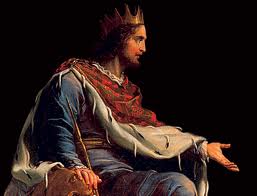 Psalm 45 was most likely composed as a wedding song for the king of Israel. It starts as follows: “My heart is stirred by a noble theme as I recite my verses for the king; my tongue is the pen of a skillful writer. You are the most excellent of men and your lips have been anointed with grace, since God has blessed you forever . . .” (Ps. 45:1-2) – As you can see, originally, the text applied to an earthly ruler of Israel, who is called “the most excellent of men.”
Psalm 45 was most likely composed as a wedding song for the king of Israel. It starts as follows: “My heart is stirred by a noble theme as I recite my verses for the king; my tongue is the pen of a skillful writer. You are the most excellent of men and your lips have been anointed with grace, since God has blessed you forever . . .” (Ps. 45:1-2) – As you can see, originally, the text applied to an earthly ruler of Israel, who is called “the most excellent of men.”
Verses 6-7, quoted by the author of Hebrews, should be rendered as follows: “Your throne, is the throne of God. It will last forever and ever, and righteousness will be the scepter of your kingdom.” How do we know that the throne of a Davidic king was considered to be the Throne of God Himself?!
We have a direct biblical evidence to support this view: “Then they acknowledged Solomon son of David as king a second time, anointing him before the LORD to be ruler and Zadok to be priest. So Solomon sat on the throne of the LORD as king in place of his father David.” (I Chronicles 29:22-23) – As you can see, the throne of an earthly king of Israel was believed to be the royal seat of the LORD Himself! That’s how the psalmist was able to say, “Your throne, is the throne of God,” While addressing a human being anointed to be the king of God’s Chosen People!
Even more stunning, the throne of an Israelite king is called in the Scriptures “the throne of the Kingdom of God”! Take a listen to the following: “Yet the LORD, the God of Israel, chose me from my whole family to be king over Israel forever. He chose Judah as leader, and from the house of Judah he chose my family, and from my father’s sons he was pleased to make me king over all Israel. Of all my sons—and the LORD has given me many —he has chosen my son Solomon to sit on the throne of the kingdom of the LORD over Israel.” (I Chronicles 28:4-5) – Isn’t that a powerful verse! As you can see, there is no need to invent a Cosmic Son of God, who is a Second body within a multi-headed pagan deity called the Trinity, in order to understand what the Bible really says!
Besides all of this, verse 7 of Psalm 45, quoted in Hebrews 1:9, states that “You love righteousness and hate wickedness; therefore God, your God, has set you above your companions by anointing you with the oil of joy.” The Hebrew original does not read “above your companions” but rather “apart from your companions,” conveying the idea of someone being chosen from a large pool of possible candidates! Notice that the addressee of the prophetic oracle is set apart from the "competition” by means of being anointed. Prior to that, he has no claims to the exalted throne of Israel. That was true of King David; is that also true of the Second Person of the Divine Pantheon? It simply cannot be!
Also, the word translated here as “companions” means someone’s peers or friends. Thus, for instance, King David was singled out by God from among his seven brothers and a multitude of other citizens of Judah, who were his equals, companions and friends. In light of this, ask yourself the following question: “From among the heavenly host created by God, who would qualify as an equal and a companion to the Son of the Deity, who is co-equal, co-eternal, and, yes, co-creating with the Almighty?!”
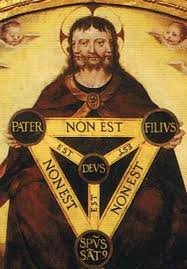 According to the Church dogmatism, the Cosmic Christ is unlike any other heavenly creature. In fact, he is considered not to be a creature at all! His absolute and unrepeatable uniqueness is emphasized in the Church’s Confession of Faith called the Nicene Creed:
According to the Church dogmatism, the Cosmic Christ is unlike any other heavenly creature. In fact, he is considered not to be a creature at all! His absolute and unrepeatable uniqueness is emphasized in the Church’s Confession of Faith called the Nicene Creed:
“We believe in one God, the Father Almighty, Maker of all things visible and invisible. And in one Lord Jesus Christ, the Son of God, begotten of the Father [the only-begotten; that is, of the essence of the Father, God of God], Light of Light, very God of very God, begotten, not made, being of one substance with the Father; . . .” –
The Heathen Church had to come up with some pretty fancy terms to provide an adequate definition for the Second Person of their Divine Pantheon! We are to admit at this point, that if we are honest in our approach to the biblical text, then Psalm 45 simply cannot speak of such an exalted and unique entity as the Cosmic Son of God, created through the medium of the Gentile Church’s wild pagan imagination! Please, take your time to read Psalm 45 through to the end. You will be able to acknowledge that when biblical texts are read in their proper context, they yield a much better understanding of God’s eternal Truth!
Hebrews 1:10-12: “ . . . In the beginning, O Lord . . .”
Having misapplied the words of Psalm 45, the author of the Epistle to Hebrews, follows it with the biblical text that has nothing to do with the notion of the Cosmic Son of God, whatsoever! Most probably, his intended audience was completely unversed in the Hebrew Scriptures, (just as much of Christianity is today), which gave this Christian theologian a free reign when it came to quoting the Bible creatively in order to support his novel views!
And so, our dear Christian fraudster continues unabashedly: “He also says, “In the beginning, O Lord, you laid the foundations of the earth, and the heavens are the work of your hands. They will perish, but you remain; they will all wear out like a garment. You will roll them up like a robe; like a garment they will be changed. But you remain the same, and your years will never end.” (Heb. 1:10-12) – He lifts this quote from Psalm 102:25-27. Please, read the Psalm in its entirety to ascertain that it speaks about the LORD God of Israel and no other deity!
 The psalmist speaks about Israel’s restoration and assures his listeners that the LORD will rebuild Zion. Here is how the Psalm builds up toward the verses quoted by the NT writer: “Hear my prayer, O LORD; . . . But you, O LORD, sit enthroned forever; your renown endures through all generations. You will arise and have compassion on Zion, for it is time to show favor to her; the appointed time has come. . .The nations will fear the name of the LORD, all the kings of the earth will revere your glory. For the LORD will rebuild Zion and appear in his glory. . . So the name of the LORD will be declared in Zion and his praise in Jerusalem when the peoples and the kingdoms assemble to worship the LORD. . .” (PS. 102:1,12-13,15-16,21-22) - The Name “LORD” is the covenantal Name of the God of Israel, who is declared to be One in more places in the Scriptures than we could mention here!
The psalmist speaks about Israel’s restoration and assures his listeners that the LORD will rebuild Zion. Here is how the Psalm builds up toward the verses quoted by the NT writer: “Hear my prayer, O LORD; . . . But you, O LORD, sit enthroned forever; your renown endures through all generations. You will arise and have compassion on Zion, for it is time to show favor to her; the appointed time has come. . .The nations will fear the name of the LORD, all the kings of the earth will revere your glory. For the LORD will rebuild Zion and appear in his glory. . . So the name of the LORD will be declared in Zion and his praise in Jerusalem when the peoples and the kingdoms assemble to worship the LORD. . .” (PS. 102:1,12-13,15-16,21-22) - The Name “LORD” is the covenantal Name of the God of Israel, who is declared to be One in more places in the Scriptures than we could mention here!
The question then is: “How could the forger of the Epistle to Hebrews take a text that was completely unrelated to his topic and use it to support his doctrine about the Cosmic Son of God?” The answer is as simple and straightforward as the question itself: “In harmony with methods, employed by many other writers of the canonical books within the New Testament, the author of Hebrews used both fair means and foul to accomplish his goal of indoctrinating the unwashed masses of the New Imperial Religion!” Knowing full well his audience’s illiterate state when it came to the True Word of God, our Christian con artist was able to rip the biblical texts out of their context to create an intriguing collage of untruth that we are still dealing with today!
Hebrews 1:13: “The LORD said to my lord . . .”
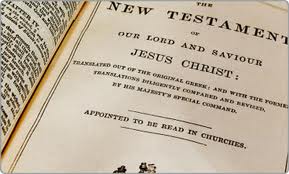 Continuing his unfounded and unproven thesis that the Cosmic Son is much superior to God’s holy angels, and, therefore, the Second Person within a three-headed divinity, the author of Hebrews concludes his long chain of misquoted texts by saying: “To which of the angels did God ever say, “Sit at my right hand until I make your enemies a footstool for your feet”?" (Heb. 1:13) –
Continuing his unfounded and unproven thesis that the Cosmic Son is much superior to God’s holy angels, and, therefore, the Second Person within a three-headed divinity, the author of Hebrews concludes his long chain of misquoted texts by saying: “To which of the angels did God ever say, “Sit at my right hand until I make your enemies a footstool for your feet”?" (Heb. 1:13) –
This particular text from the “Old Testament” is among the most popular quotations found in the New Testament! It is cited no fewer than six times by various authors of the NT books! Since we have an entire treatise dedicated to understanding this powerful biblical text, called “The LORD said to my lord . . .” – Who is the Lord speaking to in this passage?” - we shall spend but a short time addressing its import here.
Please, observe carefully the opening stanza of Psalm 110, from which our New Testament friends lifted up this enigmatic quote: “The LORD says to my Lord: “Sit at my right hand until I make your enemies a footstool for your feet.” (Ps. 110:1) – Even in an English translation, when done properly, the text leaves little to speculation!
You must have noticed that the two “lords” in the passage are spelt out completely differently: the first one is an all-capitalized “LORD” (“YHWH”), whereas the second one should be an all-lower-case “lord” (“adonee”). It is because these are two completely different words in the original Hebrew and should not be rendered as simply “Lord” in the course of translating them into English or any other language, for that matter! The all-capitalized “LORD” stands for the Covenantal Name of the God of Israel, YHWH! The second “lord” refers to a purely human being.
Whenever the Levites sang this Psalm in the Temple’s sanctuary, they would praise the LORD God of Israel, who promised King David, called “adonee” or “lord” in the poem, an everlasting throne and dominion over their enemies! There is not the slightest connotation in the Psalm that the second “lord” or “adonee” is in any way equal to the LORD God of Israel! The deliberate confusion was created by the Greek-speaking writers of the New Testament works, who used the situation to their theological advantage!
Summary Points:
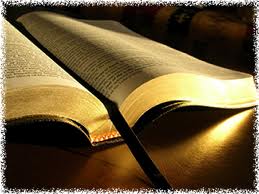 1. The Epistle to Hebrews in general and its first chapter in particular are believed to be among the “clearest” Trinitarian texts, in which our Gentile Church theologians find their refuge;
1. The Epistle to Hebrews in general and its first chapter in particular are believed to be among the “clearest” Trinitarian texts, in which our Gentile Church theologians find their refuge;
2. The notion that God “created all things through His Son” can be Scriptural only in the sense that His creative Word, that later also became flesh according to John 1:14, is called as such;
3. If we want to insist that the Word or LOGOS is a separate and independent entity within a “compounded” deity, we find ourselves in the company of Greek philosophers and pagan worshipers; we become cut off from the Chosen People of God, who are to be staunch monotheists and believers in only One Creator, -the God of Israel;
4. All the passages, adduced by the author of Hebrews to create a word-picture of the Cosmic Son of God as vastly superior to the mighty angels and equal to God the Father Himself, have no such meaning when read in their original and intended context;
5. With an exception of verses 10-12 of Hebrews 1, the adduced passages refer either to King David himself or one of his anointed descendants. Unless we believe that the ancient kings of Israel were all divine and part of some composite godhead, we should not “transform” the Jewish Messiah into a pagan Cosmic Deity either;
6. Just as the Apostle Paul in Romans 3 and other places, the Christian writer of Hebrews engages in a brazen-faced practice of ripping the biblical passages out of their context and twisting them to persuade his spiritually illiterate audience that there is such a thing as the Cosmic Son of God;
7. Hebrews 1:10-12 is made up of Psalm 102:25-27, which speaks of One God of Israel and His plan of complete restoration of Zion and her world-wide dominion once again. There is nothing in the Psalm to support the notion of an exalted Cosmic Son of the three-headed god, created by the author of Hebrews;
8. Hebrews 1:13 is one among six places within the Canon of the NT where Psalm 110:1 is quoted! The idea that it speaks of the Second Person of the Trinity, equating him with the God of Israel, can be born only out of the ignorance of the Hebrew Language, in which the text is composed. In the Greek language the difference between the two Hebrew words disappears, presenting our Gentile Church theologians with an opportunity they simply could not miss;
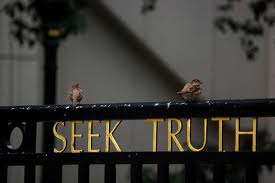 9. In the final analysis, the Book of Hebrews is yet another clear example of how a pagan religion co-opted the person, work and image of the Jewish Messiah to create its own heathen cult with the Cosmic Son of a tri-headed god at its center!
9. In the final analysis, the Book of Hebrews is yet another clear example of how a pagan religion co-opted the person, work and image of the Jewish Messiah to create its own heathen cult with the Cosmic Son of a tri-headed god at its center!
Beloved, the time has come for you, me and the rest of the world to acknowledge the fact that there is only One Living God out there! He reveals Himself as God of Abraham, Isaac and Jacob, or, the LORD God of Israel! It is also high time that the Church realized that every doctrine should be measured by the true Word of God, - the Hebrew Bible, preserved by the LORD’s faithful monotheists, the People of Israel!
 Unless and until we have become part of God’s royal priesthood and holy nation, firmly embraced the Holy One of Jacob as the sole object of our worship and veneration, and began studying His Word in earnest, we are void of His Light, Truth and Life! Where are you on your journey of life today? Come, He is calling!
Unless and until we have become part of God’s royal priesthood and holy nation, firmly embraced the Holy One of Jacob as the sole object of our worship and veneration, and began studying His Word in earnest, we are void of His Light, Truth and Life! Where are you on your journey of life today? Come, He is calling!
Till next time, - Blessings and Shalom!